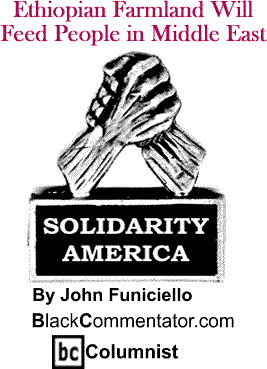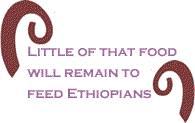
|
||||||||||||||||||||||
|
||
 |
||
The rich will always eat. Even in the worst of times,
the rich have rarely felt the pinch of hunger in their bellies.
Whether in the In the worst cases, the poor might eat a minimum of food, perhaps once a day. The rich in any country, because of their individual wealth or their class position in society, will not miss any meals. This is true of groups of people within a nation and it�s true of nations. Increases in populations and the disparity in wealth in many countries are causing countries to worry about their ability to feed their people. A few names that come to mind
are In
His company, Saudi Star, plans
to invest another $2 billion in the fertile lands of Some are calling it a land grab, some call it a land rush, others refer to it as a kind of new colonialism. But the fact remains that small farmers will be driven off their lands to be replaced with a kind of cash crop that will benefit a few corporations or individuals. In the old colonialism, rulers sent in their governors and managers and consolidated land for the production of tobacco, cotton, and other crops that would bring profits in the world market. The people did the work, but they did not benefit and they no longer had their own small holdings to grow their own food. Or the land they held in common that fed their herds or flocks was taken for growing the world cash crop. In this latest manifestation, based on the so-called global free market philosophy, entrepreneurs convince governments of small nations that the leasing or sale of large tracts of land to foreign business enterprises will be a benefit to the people. In
GRAIN, a small international non-profit group that supports small farm agriculture and community-based social movements for control of their own lives, has been following the new developments in land-grabbing and it was their research and that of other groups into land use in Africa, Asia, and Latin America that was used in the Mail and Guardian�s report. And it�s not as if big money is being put into the coffers of the Ethiopian or other governments. Some land deals are going for as little as $1 per acre for 99 years. By any standard, that�s cheap land and you can be sure that the labor is just as cheap, therefore exploited labor. Why are governments and in many cases, investment bankers or hedge fund managers, going from country to country to find land to buy or lease? Simply because they can�t feed their own people or they will be in that position shortly. They don�t want repeats of food riots that have occurred by the hundreds around the world just in the past three years. Although there are problems and expenses of transportation, packing, and distribution once they get to the target country, those seem to be lesser problems now, compared with the unrest that is possible if people don�t have something to eat every day. As the food shortages increase, the �food insecurity� will move on up the class ladder, and governments don�t want middle classes or educated working classes going hungry for too long in the course of a week. The search for land is an age-old one and has caused many conflicts and wars in history. It�s as basic as feeling hungry at the end of a long work day. Civilization was supposed to minimize the impulse of people to take from neighbors what was not theirs. Commerce in the modern era is seen to be different, especially when we have been pounded by the propaganda that the �free market� will save us, that �global free trade� will help everyone. It�s clear in the case of the taking of land that doesn�t belong to the buyers or renters that they are overriding local custom and tradition and bringing the weight of heavy capital down on the necks of local peoples.
This is happening on at least
two continents, in Africa and in As long as there is food in
those supermarkets, indeed, the rich will eat. BlackCommentator.com
Columnist, John Funiciello, is a labor organizer and former union
organizer. His union work started when he became a local president
of The Newspaper Guild in the early 1970s. He was a reporter for
14 years for newspapers in |
||
If you would like to comment on this article, please do so below. There is a 400 character limit. You do not need a FaceBook account. Your comment will be posted here on BC instantly. Thanks. Entering your email address is not mandatory. You may also choose to enter only your first name and your location.
|
||
Thank you very much for your readership. |
||
| Any BlackCommentator.com article may be re-printed so long as it is re-printed in its entirety and full credit given to the author and www.BlackCommentator.com. If the re-print is on the Internet we additionally request a link back to the original piece on our Website. | ||
| |
||
March 25, 2010 |
| Executive Editor: David A. Love, JD |
| Managing Editor: Nancy Littlefield |
| Publisher: Peter Gamble |
| Est. April 5, 2002 |
| Printer Friendly Version in resizeable plain text format |
 |
 |
 |

|
 |
| |
| |

































 For
example, the land on which the giant greenhouse - with its controlled
environment and water - sits on 2,500 acres leased for 99 years
by Ethiopian-born billionaire, Sheikh Mohammed al-Amoudi, said to
be among the richest 100 persons in the world. He lives in
For
example, the land on which the giant greenhouse - with its controlled
environment and water - sits on 2,500 acres leased for 99 years
by Ethiopian-born billionaire, Sheikh Mohammed al-Amoudi, said to
be among the richest 100 persons in the world. He lives in  They
don�t talk in terms of a few thousand acres, either. They are leasing
or buying tens of thousands of acres or millions of acres. The Saudi
sheikh�s company is just one of hundreds looking in
They
don�t talk in terms of a few thousand acres, either. They are leasing
or buying tens of thousands of acres or millions of acres. The Saudi
sheikh�s company is just one of hundreds looking in 
 As
one ex-patriot Ethiopian who now lives in
As
one ex-patriot Ethiopian who now lives in 













